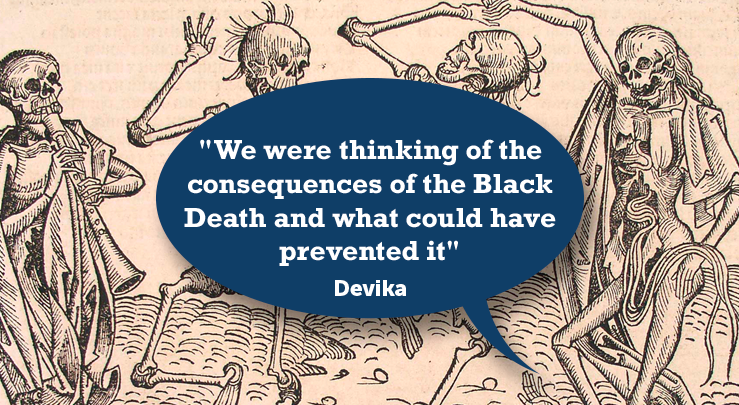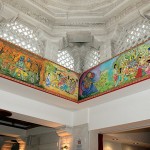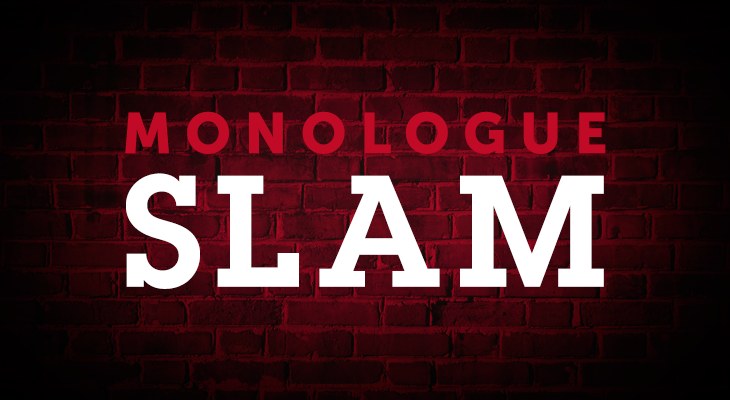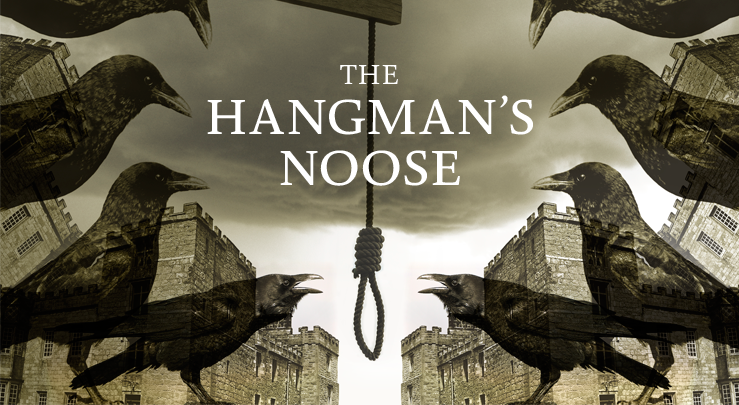As a designer I see Avanti Schools differently to my colleagues in education. I come with pre-conceived ideas, but I’m happy to stand corrected. I once thought of 11 to be an awkward stage – not quite a child, but not quite a teenager. Giggly and distracted, yet quick to assert independence, I’ve found it a challenge to connect with someone at this in-between age. A chat with five level-headed Avanti House pupils has certainly set me straight – 11 is the new 16.
Interview by Matthew Whitlock
[hr]
Was it your own decision or was it a family decision to come to this school?
Vital: Well first I was actually going to another school, and then I found out about this school through the Hare Krishna Temple – it was on the noticeboard, so first my Mum looked into it and said “Let’s try it. If after a year you like it, you can stay, and if not, you can go somewhere else.”
Are things going well for you?
Vital: Yes, I really like it.
Sometimes kids are really nervous about starting secondary school, as there’s lots of myths around what it’s like. You’ve been quite lucky because there’s no kids older than yourselves.
Vital: It does make life easier!
How did you find out about this school?
Devika: A lot of my friends were coming to this school. One of my friend’s Mum’s told my Mum, so that’s how I first found out about it.
So there’s been lots of word of mouth? With brand new schools, not many people know about them, which makes it hard to find information on them. Were your parents worried that there was no history to the school that they could base a decision on?
Devika: They were probably more worried about what might happen in a few years time, with the site – will there actually be a proper school. But it’s good – I like it.
So, you like it, but how about your parents?
Devika: They REALLY like it!
It’s the classic question that kids everywhere have always been asked by parents: “how was school today?” Do you all get that too?
The group: Yeah!
Devika: On occasion, but I tell them a lot anyway!
Personally I would sometimes find school boring. Anyone here find school boring?
Yash: It depends what subject. If it’s a fun day, I’m not bored – I’m really excited. Writing subjects I sometimes find boring.
So what makes a good day for you?
Yash: Friday, because I like sports and we have a double period of PE, then a little break which is Maths.
For some kids that would be the worst day of the week!
Yash: That’s what my sister says. Then straight after Maths, which is quite relaxing for us, we have Dance, which is another thing I think is good.
Hmm, another energetic subject that requires for you to be quite athletic. But how do you find remembering all the moves and routines?
Yash: It’s easy really. We’re taught some moves by the teacher, but we can also make up our own which makes it easier.
[quote float=”left”]Maths is quite relaxing for us – Yash[/quote]
There’s lots of good things being said about this school at the moment, especially around the academic results that are coming back, which are really REALLY good. Are kids aware of how outstanding the results are?
Nisha: I think so. We all try hard.
Does it make the kids big headed?
Nisha: Nope!
But if you met a friend of yours that went to a different school, would you be quite proud to tell them about the successes of your school?
Nisha: Yes.
Is there any rivalry between kids, about who has the best school?
Nisha: Perhaps a bit, but we don’t really fight over it.
I’m sure you don’t mean physically anyway! There was rivalry between schools when I was younger, but it wasn’t over who had the best school – they were all bad! It was just a childish territorial thing really. Kids at this school seem far too mature for anything like that. The average age now is 12, right?
The group: Yes – 11, 12.
Maybe it’s the blazers (laughter!) but there’s definitely an atmosphere of maturity and calm at the school. I don’t sense chaos like I’ve experienced in other schools. Do you agree Nisha, or is it just the adults that see it that way?
Kashish: No it’s true. Other schools are very crowded, with lots of shouting, but it’s not like that here.
What would you improve about the school?
Kashish: Not sure. Everything is quite good.
It’s not a trick question! It’s just as interesting and important to talk about the things to improve as it is to talk about the good stuff. Surely there’s something you’d like to see. By giving feedback to the right people, your ideas can improve the plan for the school.
Kashish: I think cookery would be good if we had the facility.
How do you get your points across to the staff? If you feel something is missing or not working, how do you communicate that?
Kashish: Nearly all of the staff are very understanding. They understand that everyones’ at different levels in subjects. They never get angry if we’re confused because they all know we have different strengths.
Is it important to you that teachers are patient?
Kashish: I think it’s really important. Some teachers in my old school were not as understanding, but they are here.
Were your parents supportive of you choosing this school? Do they like the message of the school, and it’s particular approach?

Design a new breakfast cereal or YOU’RE FIRED!
Kashish: Yes, they felt a bit angry about my last school. My family is quite religious, and they wanted me to have a school that shared our values.
Can you tell me about the work you did during the Young Apprentice project? I hear your year had to compete to design a new breakfast cereal?
Devika: It was a lot of fun. We worked in our form group, which has about 15 pupils. We all had a lot of responsibility – not just the project manager. The work was split – some were in charge of the money, some were designing and advertising, some were coming up with ideas…
There must have been some conflicts of interest right? Tell me about the juicy stuff! And if you had conflicts, how were they resolved?
Devika: There were some conflicts – like, most of our class thought the project manager was being too bossy, but by the time we were able to tell that person, everything was pretty much done. There was definitely a point where we wanted him replaced!
So there was almost a mutiny?!
Devika: He was ok. He gave us our work and we got it all done, but on the last morning during our final preparation, we lost our cereal packet. In 15 minutes we had to create a new one. We worked as a class and the team spirit was really friendly.
The disappearance of the cereal packet sounds suspicious. Did you not suspect it to be sabotage from another class?
Devika: We did actually, but we think probably one of the cleaners found it on the floor and threw it away.
That’s flattering I suppose, that it was mistaken as a real packet! Yash – what part did you play in the project?
Yash: I was co-project manager, for the same team that Devika was in. I was making sure everyone was doing their job.
Basically cracking the whip?
Yash: Yep! I had to make sure nobody was working outside of the rules. I caught two team members bringing materials in from home, and there was a fine of £100 each for that. The rules were that we could only buy or borrow materials from the school reception, using the fake money we were given. So it was a lot like The Apprentice on TV.
Devika: There was a conflict between two of the classes when some of our posters were found on the floor and we blamed another class for taking them down. Another time we found one of the classes leaflets and we read it to see what they were planning.
I guess they shouldn’t have been so careless right? How about you Nisha, what role did you play?
Nisha: I was in a different class. Another girl and I were responsible for the jingles used in the advertising.
Are you quite a creative person?
Nisha: Kind of.
So it’s not a co-incidence that you were picked for that type of task?
Nisha: We weren’t expected to do things we didn’t want to. At first I was asked to work with the money, but I thought the jingles would suit me better, and I think it was a very important part of the project. Without the jingles, we wouldn’t have had the advert. It was used as a background to the video we made. We even wrote the music for it too.
Are you hoping for a career in music and the arts?
Nisha: Actually, I’d like to be a teacher.
How about yourself Kashish – have you thought about a career yet?
Kashish: It’s a bit early for me to know yet.
This school gives a lot of attention to the arts. Do you feel that if you wanted a career in the arts that you’re in the right place?
Kashish: I think there are more opportunities here than in other schools. If you wanted to do something more creative than academic you could, like acting, dance, things like that.
Do teachers at Avanti House encourage students in directions that suit them best?
Kashish: They definitely help you to find your strengths and challenge you so that you become more confident in the areas you need to improve in.
Apparently you’ve recently visited the Museum of London and the Barbican. Can you tell me something about the trip?
Vital: Well first we started off by handling objects that were discovered in Britain by archeologists. They had to handled really carefully with special gloves because they could crack so easily.
Wow – they put a lot of trust in you.
Vital: Yeah – they were really old and really fascinating to hold. Some objects looked like they were made out of metal or other materials but they were actually made out of bone.
Were you briefed beforehand on your outcomes for the trip?
Devika: In the morning we were given booklets that we had to fill out during the museum trip. One section was called ‘Investigating Medieval Life” and we had to go around and answer all the questions by searching for the information, for example by watching videos about the Black Death (face contorts!).
[quote float=”left”]We were thinking of the consequences of the Black Death and what could have prevented it – Devika[/quote]
Was that quite gruesome?
Devika: It didn’t give me nightmares, so it wasn’t too bad. Actually it was fun!
Asides from the questions you were given, were you asked to produce a piece of work or a project of your own choosing? Were there any creative aspects to the work that followed?
Devika: We worked on that subject for the following week. For the topic we were thinking of the consequences of the Black Death and what could have prevented it. One of the tasks was to pretend you were a monk and were writing a diary at that time.
Let’s say you hadn’t been on that trip – how much harder would it have been for you to visualise life in that time?
Yash: It would have been much harder. It helped us to picture the scene of how people spoke and acted. Also the kind of objects and things people used. There were no mobile phones in those days. There was very little technology in those times. We got to see the things they used in cooking, things they used for doing business – things to do with finance as well. In the museum, there were tables with objects laid out and we had to decide which category these objects belonged to.
Was there anything you learned that was particularly memorable or came as a surprise to you?
Nisha: There was one thing we were shown and we were guessing for ages. Then we found out it was a part of a purse. The velvet had fallen away and all that was left was the metal edge, so it was hard to figure out what it actually was.
Vital: There was a pair of ice skates (see right). Now we use metal, but then they used bone as the blade. And it wasn’t a boot. The blade was strapped around your shoes.







